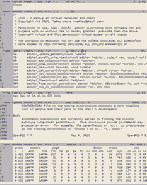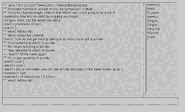Some of these projects are published under a non-restrictive open source license allowing commercial use. A smaller percentage are published under a copyleft-license. Rest still require work before publishing under any license. Several of the projects are only useful for retro-computing, retro-gaming or source code archaeology interest.
Minimal or zero external dependencies are required apart from requiring POSIX-compliant base environment with the standard tools installed. This means everything that is developed should compile and run with minimal effort on most sane operating systems with the standard development tools installed. This author personally develops on OpenBSD using the C programming language, avoiding choices that would decrease portability or increase risk for incompatibilities over time.
You can help by submitting patches that fix bugs, bring features, or you can become a package maintainer and submit any of these projects for your favorite operating system's package collection. (If you wish to become a package maintainer, please contact me so that we could agree on a release model because most of the projects have none.)
Statistics of the published original source code that is stored
in GitHub.
Projects published: 43
This is about 3210 A4-sized pages if printed out.
That would weigh about 16 kg as a 20 cm tall stack
if printed as single sided sheets.
Project founder, leader, designer and one of the core developers for a
massively multiplayer online role-playing game and its tools (such as custom
collaboration tools for managing the development). These still work and can
be set up and play tested.
Visit Majik 3D MMORPG for more information about the project. You can also play the text version from 1998.
Source code:
Also see iosplit which can
be used as a simple MUD client and
simulbaud which can be
used for slowing down output.
Helped to set up Spellbound MUD, which was based on Majik 3 codebase.
A parody of a MUD. This game was about making "exp" (experience points),
not caring realism. For making it even more hilarious, it is translated to
Finnish in the most straight-forward manner. Even though the developers of
Majik were attempting to develop a game that would not have "exp-making",
this EkspaMUD game actually became more popular than the other versions.
You can play it using telnet.
Software developer (wizard) of BatMUD game, developing in-game environments
for exploration. Still works.
tfmud is a "text first" Multi
User Dungeon engine which attempts to take the utmost advantage of the text
format without polluting the game with any sort of 2D/pseudographical
elements. See Majik 3D
MMORPG's future page for more information.
Over the years developed or contributed to various text-based and graphical games
on Linux, Unix, Windows, Amiga, C64 and NES platforms. See
Mobygames
for developer profile listing some contributions.
Debian Linux package maintainer. Debian contributor profile.
Packaged and maintained
Pike
dynamic programming language for Debian Linux distribution.
Among other things, implemented FTP over e-mail, WWW over e-mail and
similar gatewaying and convenience systems for getting most of batch-run
e-mail.
Contributed changes to most parts of the system and implemented new tools,
such as a new realtime chat system, new games with shared scoreboards,
a foreign platform's door-game emulator, a new terminal emulator, a new
realtime remote viewing facility of user activity.
Also found and fixed multiple vulnerabilities in software written by
others, including remote access vulnerabilities.
This window manager was originally meant to be used in combination with
a specialized unpublished terminal emulator by the same author,
cocovt, however it is also usable on its own.
See animated screenshot of vtsh running ed.
See also purehtml which is a purely HTML-only
parser, but it is filed under the Small Internet
category here.
Useful as a MUD client, or when communicating over slow links, or when
communicating with line-based protocols such as raw IRC protocol,
raw SMTP, embedded devices, etc.
Statistics
Published lines of code: 192658
Total commits: 939
Commits from contributors: 148
Last updated: September 29, 2022
LPC 120150 lines (top: majik3)
C 54084 lines (top: vtsh)
C++ 9939 lines (top: majik3d-client)
HTML 3340 lines (top: majik3)
Shell 3048 lines (top: majik4-client)
Java 809 lines (top: jicra)
Roff 399 lines (top: mxswm)
M4 399 lines (top: majik4-client)
Javascript 312 lines (top: majik3)
AWK 178 lines (top: purehtml)
Multiplayer games
Majik 3D MMORPG a.k.a. Majik MURPE (1995-2002)
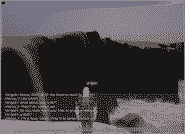

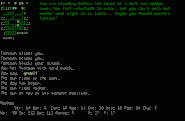
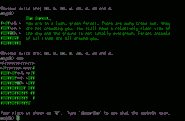
Spellbound
EkspaMUD
BatMUD (1997)
tfmud
Other games
Linux distributions
Debian Linux (1997-1999)
Network pioneering
Znet UUCP network non-profit (1995-1996)
BBS software developer and operator (1994-1996)
Cybersecurity
Virus-removal tool (1998)
webgw
xout
xin
X Window System (X11) GUI programs
cocowm
mxswm
cocovt
vtsh
xvbox
xrtgauge
xrtgraph
xrtmap
freedesktop.org startup-notification contributions
Software testing tools
crbehave
Parsers and frontends for data interchange formats
dhdb
dhdb-edit
ivjson
jsonkv
xmlkv
canal
Network protocol libraries
emws
Other libraries
editbuffer
"Small Internet"-related tools
purehtml
gemcache
gemsrv
gemsurf
xd
gopherd
General Linux/Unix-tools
iosplit
simulbaud
overlay
pipebuffer
Chat programs
jicra
System administration tools
shaback
deploy
wtlyzer
xrootname
Other projects
See the repositories in
Github.

